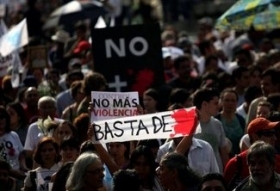In its first major political achievement since embarking on a campaign against Mexico’s drug wars, the country’s growing peace movement announced this week that it had arranged a meeting with President Calderon.
The president, and some members of his cabinet, will meet with 35 representatives of the Movement for Peace with Justice and Dignity. Many of them have lost relatives to drug violence, including poet Javier Sicilia, whose son was murdered in March by a gang. Since then the high-profile writer has led the campaign for peace, including a march across the country to Ciudad Juarez, Mexico’s most violent city.
The meeting was originally slated to take place on Thursday, June 23 at the National Museum of Anthropology, a location that the group had selected as symbolic of the “national re-foundation” that the country needs. However, at the last minute officials changed the location to the Chapultepec Castle, according to El Universal. Presumably the switch was made for security reasons, in an effort to limit the chances of the meeting being disturbed by protests.
Mexico’s Interior Ministry confirmed the meeting, saying that the government has been seeking input from civil society “since the beginning of the implementation of the National Security Strategy.” This has been refuted by Sicilia and others, however, who have complained that their calls for a national dialogue have fallen on deaf ears.
It was not immediately announced which cabinet members would attend the meeting, or whether they would include Public Safety Secretary Genaro Garcia Luna, who has been a target of the movement since they first demanded his resignation during a public protest in May.
According to El Universal, Sicilia and other members of the movement will request specific changes in Mexico’s approach to national security, and call on the government to devote more attention to victims of violence.
Specifically, their main pressure points are likely to be the six demands detailed in their National Pact, which was signed in Ciudad Juarez on June 14 by the various organizations taking part in the movement. Broadly speaking, the demands include giving more visibility to the victims of violence and their families, ending the administration’s “militarized approach” to combating crime, punishing corruption and impunity, working to address the social and economic causes of organized crime, rebuilding Mexico’s “social fabric,” and moving the country towards a more participatory and representative democracy.
On one hand, there seems to be a significant amount of support for the current anti-violence movement in the country, which is a promising sign. As InSight has reported, the official strategy of high-value takedowns of gang leaders has been criticized by experts for contributing to the explosion of violence in the country, which has killed as many as 40,000 people in organized crime-related violence since Calderon took office. Because of this, the time could be ripe for a significant shift in policy.
Given of the far-reaching nature of these demands, however, the meeting is more likely to be a disappointment to the group. Although the president is sure to express his empathy with the victims, he will almost certainly pair this with his oft-repeated claims that his aggressive anti-crime strategy is working, and making serious inroads against organized criminal groups in the country. The capture days previously of drug lord Jose de Jesus Mendez, alias “El Chango,” a leader of the Familia Michoacana, will help him make his case.
Still, a lack of response from the government will probably not dissuade the protestors, who have been picking up steam over the past several months and have managed to broaden their coalition across both class and ideological lines. After the meeting, Sicilia and the attendees say they will be part of a march on Sunday to bring food supplies to the mountain community of Cheran, Michoacan, whose inhabitants have suffered weeks of raids by armed gangs allied with illegal loggers.

